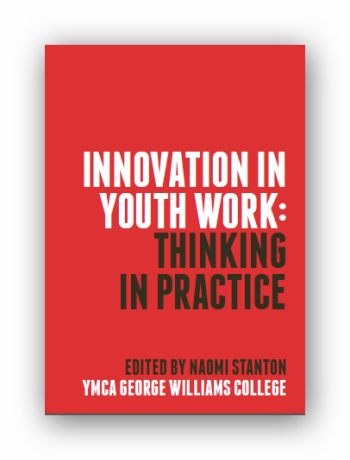Exploring the theory and practice of youth work and youth development
On this page: introducing youth work • features • youth work pioneers • key reports • in the archives
new
YMCA and the development of informal and youth work education. In this major new piece, Tony Jeffs reflects on the YMCA’s 135-year engagement across the world with the professional education of those working with young people. He examines both the innovations and tensions involved in the growth and experience of different programmes, and the factors that led to the decline of informal and youth work education within the YMCA. This important research is also available to download as a pdf.
Fred Milson: developing the practice of youth and community work. Fred Milson (1912-1983) was an influential writer and trainer who did much to develop youth and community work practice within the Methodist church and the Youth Service generally. He was also an important contributor to national policy debates. The update includes a large amount of additional material about Fred Milson’s life and some updating of the rest of the text. [Major update].
Marie Paneth – Branch Street, The Windemere Children, art and pedagogy. Paneth was a talented painter, art therapist and pedagogue. Her book, Branch Street (1944) is a classic exploration of community-based work with children during the Second World War – and the healing use she made of art both with The Windemere Children (2020) and in later practice was pioneering. In this piece we explore her work – mostly in the 1940s – and continuing relevance. [Major update]
Josephine Macalister Brew, youth work and informal education. One of the most ‘able, wise and sympathetic educationalists of her generation’, Josephine Macalister Brew made a profound contribution to the development of thinking about, and practice of, youth work and informal education. [Major update with extended biographical detail].
Pearl Jephcott, youth and the lives of ordinary people. Pearl Jephcott produced a series of influential studies of the lives of young people and was an important figure in the development of thinking about youth club work. She also undertook a number of studies that added significantly to our appreciation of working-class life. [Major update]
Introducing youth work
introducing youth work
What is youth work? How has it developed? Includes a guide to further reading.
school-based youth work
The growth of youth work in schools and current practice reviewed + an annotated bibliography.
detached youth work and project work
The background to the development of the work + a full annotated bibliography concerning theory and practice.
youth cafés
A new set of pages in preparation.
Featured
Alan Rogers – Starting out in detached work. This classic (1981) booklet described and explained some of the causes of isolation experienced by detached youth workers and offered guidelines for action and recording during these early months which provided a means of identifying problems and overcoming them.
Citizenship, youth work and democratic renewal. Tony Jeffs examines current and historic concerns with citizenship within British youth work and the direction of government policy. He argues that informal educators must be wary of pseudo-democracy and work to cultivate small pockets of genuine deliberate democracy wherein citizenship survives and from which it will range forth.
Transforming youth work: We explore the flawed and demeaning vision that lay at the heart of the English youth work strategy in the early years of the new millenium.
Creating partnerships in education. In this piece Thoby Miller evaluates the educational needs of young people; examines the professional insularities which exist between teachers and youth workers and consider how their respective inputs into the lives of young people might be developed into a partnership; and discusses the human tendency to identify by difference.
Individualization and youth work. Tony Jeffs and Mark K. Smith examine the shift away from a concern with the group and association in many youth services and agencies.

Young people, informal education and association: Mark K. Smith argues for the recovery of association as a central theme in youth work, and the need to re-embrace the notion of the club.
The significance of Circular 1486 – The Service of Youth. Circular 1486 is usually taken as marking the beginning of the youth service in England and Wales. Published in 1939 Jonathan Roberts assesses its significance. Also read the full circular.
Summer camps, camp counselors and informal education: We survey the development of organized camping and examine proposals for youth summer camps in England.
The problem of ‘youth’ for youth work. The full text of the Youth and Policy 63 article by Tony Jeffs and Mark K. Smith that argues ‘youth’ has become a deeply problematic notion and that just as ‘youth work’ appeared at a particular moment, so it will disappear. Jettisoning the obsession with age-specific activity allows workers to focus on education and association and, in so doing, helps all to create for themselves, in the words of Margaret Simey, ‘a life worth living’.
Lily Montagu. A pioneer of youth work, one of the founders of the National Organization of Girls Clubs (now Youth Clubs UK) and a key figure in the development of Jewish youth work. A short biography and bibliography prepared by Jean Spence.
Youth work pioneers
Robert Baden Powell – the founder of Scouting.
Dr Thomas John Barnardo – founder of the famous homes.
Mary Carpenter -Pioneer of reformatory schools.
Pearl Jephcott – Produced a series of influential studies of the lives of young people and was an important figure in the development of thinking about youth club work.
Sandra Leventon (1938-2001) was a key figure in the development of youth work in the UK. Doug Nichols and Lucette Tucker reflect on her contribution.
Josephine Macalister Brew – pioneer of informal education and of youth work.
Lily Montagu – a pioneer of youth work.
Hannah More – A key figure in the development of Sunday schooling.
Marie Paneth – Paneth was a talented painter, art therapist and pedagogue. Her book, Branch Street (1944) is a classic exploration of community-based work with children during the Second World War.
Charles Russell – Writer of a classic text on boys’ club work and innovator in practice.
Tom W. H. Pelham – Writer of one of the first texts on boys’ club work and and an important figure in the development of the work.
Maude Stanley – A key figure in the development of girls’ club work.
Arthur Sweatman – writer of one of the first accounts of youths’ club work.
Key reports
‘Albemarle Report’ – The Youth Service in England and Wales. The Albemarle Report (1960) provided youth work in England and Wales with a very influential rationale and framework – and was a key element in substantially increasing funding for youth work. See: Chapter 1: The Youth Service yesterday and today; Chapter 3: Justification and aims of the youth service; Chapter 5: Activities and facilities and Chapter 10: Recommendations and priorities.
The significance of Circular 1486 – The Service of Youth. Circular 1486 is usually taken as marking the beginning of the youth service in England and Wales. Published in 1939 Jonathan Roberts assesses its significance. Also read the full circular.
Department of Education and Science – Youth and Community Work in the 70s. A collection of chapters from the ‘Fairbairn-Milson’ Report (1969).
Ministry of Education: The aims and purpose of the youth service. This Report of the Youth Advisory Council appointed by the Minister of Education in 1943 (and published in 1945), provides a classic statement of youth work as non-vocational group work.
Youth Matters – the green paper on youth services. Here we outline the main proposals of the new English ‘Green Paper for youth’ – Youth Matters – and highlight some of the key issues and problems arising from it. These include a continuing attack on the civil rights of young people. Read, also about the background to the paper.
Youth Strategies 2007: checkout the different strategies adopted in England, Northern Ireland, Scotland and Wales.
In the archives
‘Albemarle Report’ – The Youth Service in England and Wales. The Albemarle Report (1960) provided youth work in England and Wales with a very influential rationale and framework – and was a key element in substantially increasing funding for youth work. We reproduce key chapters.
Board of Education (1939) Circular 1486 – The Service of Youth. Circular 1486 is usually taken as marking the beginning of the youth service in England and Wales.
Jeffs and Smith – the problem of ‘youth’ for youth work. Article argues that ‘youth’ is now a deeply problematic notion and just as ‘youth work’ appeared at a particular time, so it will disappear (1999).
Ministry of Education: The aims and purpose of the youth service. This Report of the Youth Advisory Council appointed by the Minister of Education in 1943 (and published in 1945), provides a classic statement of youth work as non-vocational group work.
Rogers – Starting out in detached work. This classic (1981) booklet described and explained some of the causes of isolation experienced by detached youth workers and offered guidelines for action and recording during these early months which provided a means of identifying problems and overcoming them.
Smith – creators not consumers. rediscovering social education
Full version of this 1982 youth work text
Smith – developing youth work. informal education, mutual aid and popular practice
The full text of the 1988 edition is now on line.
Stanley – the way to start and run a girls’ clubs
Maude Stanley’s (1890) handbook Clubs for Working Girls was the first substantial exploration of what was involved in girls’ club work. Here we reproduce Chapter II. In it Stanley sets out her view of some of the key characteristics of such youth work
Stanley – ‘night schools’
This piece provides an insight into the way in which parish visitors approached their tasks – in particular, how they related schooling and club work to outreach. Taken from Chapter IX of Maude Stanley’s (1878) Work About The Five Dials, London: Macmillan.
Sweatman – youths’ clubs and institutes
Arthur Sweatman’s (1863) groundbreaking paper was the first to describe and advocate club provision for youths. It provides a particularly helpful insight to some of the activities of early clubs and institutes.
Acknowledgement: Photo by Luke Ellis-Craven on Unsplash
